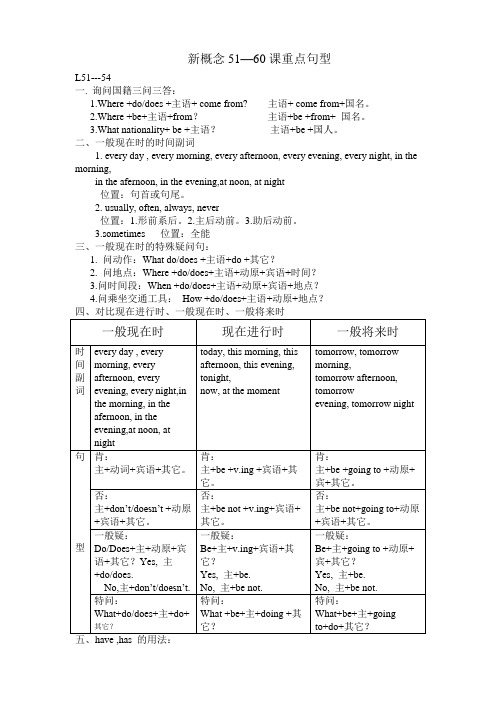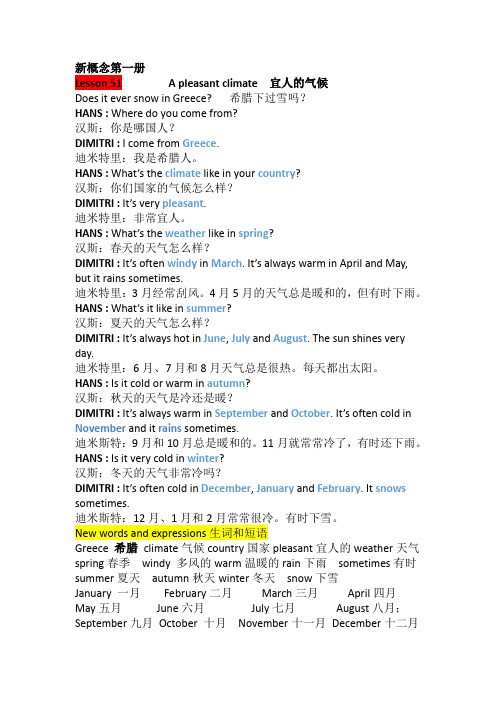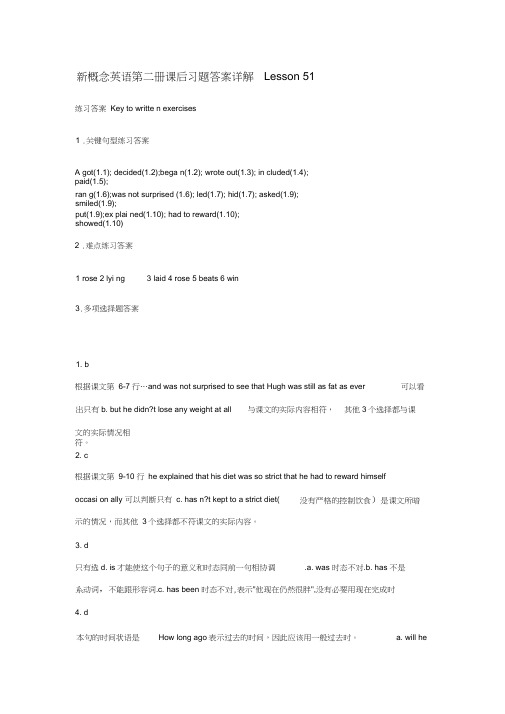新概念50-60课联系
新概念英语第二册Lesson59~61语法知识点(最新)

新概念英语第二册Lesson59~61语法知识点(最新)新概念英语第二册Lesson59语法知识点1.复习第50~58课语法He's having lunch , isn't he?他正在吃午饭,是不是?(现在进行时表示说话时正在进行的动作) Yes,he always has lunch at this time of the day.是的,他每天总是在这个时间吃午饭。
(一般现在时表示习惯性动作)She's reading a book,isn't she?她正在读一本书,是不是?Yes,she's been reading the book all morning.是的。
她整个上午一直在读这本书。
(现在完成进行时强调动作的持续性)I was told that ships were built here.我听说这里造过船。
(被动语态was told表示说话谨慎;从句中的一般过去时表示不知现在是否仍造船)They used to be built here,but they aren't any more.过去这里是造过船,但现在不造了。
(used to表示过去有过但现在已终止的状态,强调过去与现在的对照,因此不可用would代替) You've taken your time! What on earth have you been doing?你可真够慢约!你到底一直在干什么?(on earth用于表示强调)I'm sorry.We got caught in astorm.对不起。
我们遇上一暴风雨了。
(在口语中get+过去分词相当于被动语态)2.表示目的的几种方式:to, in order to, so as to, so that, in order that(1)带to的不定式及其变体in order to和so as to 可以用来表示目的:I went to live in France to/in order to/so as to learn French.我去法国居住,以便学习法语。
新概念第二册lesson60(共40张PPT)资料讲解共42页文档

6
、
露
凝
无
游
氛
,
天
高
风
景
澈
。
7、翩翩新 来燕,双双入我庐 ,先巢故尚在,相 将还旧居。
8
、
吁
嗟
身
后
名
,
于
我
若
浮
烟ቤተ መጻሕፍቲ ባይዱ
。
9、 陶渊 明( 约 365年 —427年 ),字 元亮, (又 一说名 潜,字 渊明 )号五 柳先生 ,私 谥“靖 节”, 东晋 末期南 朝宋初 期诗 人、文 学家、 辞赋 家、散
文 家 。汉 族 ,东 晋 浔阳 柴桑 人 (今 江西 九江 ) 。曾 做过 几 年小 官, 后辞 官 回家 ,从 此 隐居 ,田 园生 活 是陶 渊明 诗 的主 要题 材, 相 关作 品有 《饮 酒 》 、 《 归 园 田 居 》 、 《 桃花 源 记 》 、 《 五 柳先 生 传 》 、 《 归 去来 兮 辞 》 等 。
1
0
、
倚
南
窗
以
寄
傲
,
审
容
膝
之
易
安
。
谢谢
11、越是没有本领的就越加自命不凡。——邓拓 12、越是无能的人,越喜欢挑剔别人的错儿。——爱尔兰 13、知人者智,自知者明。胜人者有力,自胜者强。——老子 14、意志坚强的人能把世界放在手中像泥块一样任意揉捏。——歌德 15、最具挑战性的挑战莫过于提升自我。——迈克尔·F·斯特利
新概念英语第一册50课

新概念英语第一册50课
摘要:
I.课程简介
- 新概念英语第一册50课
II.课程内容
- 课文概述
- 重点词汇和语法
- 教学目标和适用人群
III.课程评价
- 学生反馈
- 专家评价
- 课程优势与不足
IV.结论
- 总结与建议
正文:
新概念英语第一册50课是《新概念英语》系列教材的第一册,共包含50个单元。
每个单元包括一篇课文、单词和短语、语法、练习等内容,适合英语初学者学习。
本课程以语言学习为基础,注重听、说、读、写四个方面的综合能力培养。
课文涵盖了日常生活中的各种场景,如问候、介绍、道别、家庭、职业等。
重点词汇和语法通过例句和练习进行讲解,让学生在实际应用中掌握英语
基础知识。
课程的教学目标在于帮助学生掌握基本的英语语法和词汇,培养学生的英语口语和书面表达能力。
通过本课程的学习,学生可以具备初步的英语沟通能力,为进一步学习英语打下坚实基础。
新概念英语第一册50课受到了广大学生的欢迎。
学生纷纷表示,课程内容丰富、实用,老师的讲解清晰易懂,通过学习本课程,他们的英语水平得到了显著提高。
专家评价方面,新概念英语第一册50课作为一套经典的英语教材,能够满足初学者的学习需求,帮助学生轻松入门英语学习。
同时,课程在设计上注重培养学生的实际语言运用能力,有利于学生全面提高英语水平。
总的来说,新概念英语第一册50课是一套优秀的英语教材,旨在帮助初学者打好英语基础。
但是,课程的难度相对较低,对于有一定英语基础的学生来说,可能略显简单。
新概念英语第二册50课介绍

• • • • • •
【课文讲解】 1、Taken for a ride take…for… 把……当作…… taken for a ride 就当作是一次兜风 take sb. for a ride 欺骗 taken for 上当了 2、I love travelling in the country, but I don't like losing my way. • love/ like doing sth. 喜欢做某事(强调一种 习惯)
• 5、'I'll tell you where to get off.' answered the conductor. • get on the bus 上车 ;get off the bus 下 车 • I will tell you where you can (should) get off. • No one got on/off (the bus) at the last bus stop. • “特殊疑问词+to+动词原形”可用来取代宾 语从句
6. After some time, the bus stopped. Looking around, I realized with a shock that I was the only passenger left on the bus. 过了一些时候,车停了。我环视了一下四周,惊奇地发现 车里就只剩我一个乘客了。 looking around 是现在分词短语,作时间状语。
3. „I‟m going to Woodford Green,‟ I said to the conductor
as I got on the bus, „but I don‟t know where it is.‟ “ 我要去伍德福德草地,” 我一上车就对售票员说, “但 我 不知道它在哪儿。”
新概念英语第三册教学内容(全60课)

新概念英语第三册教学内容(全60课)
本文档旨在概述新概念英语第三册的教学内容,共计60课。
第1课-10课
这一部分主要介绍基础的语法知识,包括名词单数和复数形式、冠词的使用、代词、形容词、副词、数词以及一般现在时和进行时
态等内容。
通过这些课程,学生将学会基本的单词、短语和句子结构。
第11课-20课
这一部分继续深入探讨英语语法和词汇,包括现在进行时态、
一般过去时态、过去进行时态以及一般将来时态。
此外,学生还将
进一步了解关于常见动词的不同形式和用法,以及如何使用一些比
较级和最高级的形容词。
第21课-30课
在这一部分,学生将研究有关被动语态、情态动词以及特殊疑
问句的用法。
此外,课程还探讨了一些常见的交际用语和日常对话,帮助学生提高听说能力和交际技巧。
第31课-40课
这一部分着重强调阅读理解能力的提升。
通过阅读一些简单的文章和短文,学生将提高对英语语法和词汇的理解,并培养对文章主旨和细节的把握能力。
第41课-50课
这一部分继续巩固学生的阅读能力,同时加强写作技巧。
学生将进行更深入的写作练,包括书面表达和口头表达。
此外,还将研究如何写作简历和应对面试等实用技能。
第51课-60课
这一部分扩展学生的词汇,并通过一些真实场景的对话来提高听力和口语能力。
学生将研究一些关于旅行、购物、健康和日常生活的实用表达方式。
以上是新概念英语第三册的教学内容概述。
通过这60课的学习,学生将全面提高他们的英语语法、词汇、阅读、写作、听力和口语能力。
新概念英语第二册:第60课课文详解及语法解析

【导语】新概念英语作为家喻户晓的经典之作,它有着全新的教学理念,有趣的课⽂内容及其全⾯的技能训练,为⼴⼤的英语学习者提供帮助!如果你也想学好英语,⼜怎能错过新概念英语?下⾯为您提供了相关内容,希望对您有所帮助! 课⽂详注 Further notes on the text 1.A relation of yours is coming to see you.您的⼀个亲戚就要来看您了。
(1)a relation of yours为名词的双重所有格(cf.第10课语法): a friend of my father's 我⽗亲的⼀位朋友 a friend of mine 我的⼀个朋友 (2)句⼦中的现在进⾏时并不表⽰⽬前正在进⾏的动作,⽽表⽰将要发⽣的事情。
(cf.本课语法) 2.The moment you leave this tent, you will get a big surprise.您⼀⾛出这个帐篷,就会⼤吃⼀惊。
连词 the moment (that)与 as soon as含义⼀样,表⽰“⼀……就”: I'll phone you the moment I get the letter. 我⼀拿到信就给你打电话。
在这个连词引导的时间状语从句中要⽤⼀般现在时来表⽰将来时。
(cf.本课语法) 3.That is all.就是这些。
这是⼝语中常⽤的⼀句话,表⽰“完了”、“就这些”、“事情就是这样”等含义: He borrowed some money from me. That's all. 他向我借了些钱,⽽已。
4.…If forgot all about Madam Bellinsky because my wife hurried towards me.……就把别林斯基夫⼈给我算卦的事忘得⼀⼲⼆净了,因为我的妻⼦正匆匆向我跑来。
与that is all中的 all⼀样,这句话中的all也是代词,表⽰“⼀切”、“全部”、“所有的事”,注意作主语时它被视为单数: All I can remember is her name. 我所记得的只是她的名字。
新概念英语第2册重要语言点Lesson58~60

【导语】学习新概念英语并不难啊。
你还在为英语成绩低拖后腿⽽烦恼吗?不要着急,©⽆忧考⽹⼩编为⼤家提供了“新概念英语第2册重要语⾔点Lesson58~60”。
相信加⼊学习当中的你,很快便不再受英语的困扰!还在等什么?和⼩编⼀起来学习吧!新概念英语第2册重要语⾔点Lesson58 重要句型或语法 被动语态 本课侧重的是be said to do和双宾动词的被动语态的⽤法。
如: Frinley is said to possess a 'cursed tree'. I was told to wait for him. 课⽂主要语⾔点 The tiny village of Frinley is said to possess a 'cursed tree'. 1)tiny,很⼩的、极⼩的。
2)be said to,据说。
3)possess,占有、拥有。
其名词为possession,常见的短语⽤法为in possession of(占有)和in the possession of(被占有)。
4)cursed,被诅咒的。
源⾃curse(诅咒)。
Because the tree was mentioned in a newspaper, the number of visitors to Frinley has now increased. 1)mention,提及、说到。
注意该词有个常见的短语⽤法“Don't mention it!”表⽰“不客⽓!”。
2)注意区分the number of(...的数量,后接可数名词复数,但谓语动词⽤单数)和a number of(许多、⼤量,后接可数名词复数,谓语动词也⽤复数)。
3)注意visitor的词尾是-or,不是-er。
4)increase,增加、上涨。
The tree was planted near the church fifty years ago, but it is only in recent years that it has gained an evil reputation. 1)plant,种植。
新概念51-60课重点句型

新概念51—60课重点句型L51---54一.询问国籍三问三答:1.Where +do/does +主语+ come from? 主语+ come from+国名。
2.Where +be+主语+from?主语+be +from+ 国名。
3.What nationality+ be +主语?主语+be +国人。
二、一般现在时的时间副词1. every day , every morning, every afternoon, every evening, every night, in the morning,in the afernoon, in the evening,at noon, at night位置:句首或句尾。
2. usually, often, always, never位置:1.形前系后。
2.主后动前。
3.助后动前。
3.sometimes 位置:全能三、一般现在时的特殊疑问句:1. 问动作:What do/does +主语+do +其它?2. 问地点:Where +do/does+主语+动原+宾语+时间?3.问时间段:When +do/does+主语+动原+宾语+地点?4.问乘坐交通工具:How +do/does+主语+动原+地点?四、对比现在进行时、一般现在时、一般将来时一般现在时现在进行时一般将来时时间副词every day , everymorning, everyafternoon, everyevening, every night,inthe morning, in theafernoon, in theevening,at noon, atnighttoday, this morning, thisafternoon, this evening,tonight,now, at the momenttomorrow, tomorrowmorning,tomorrow afternoon,tomorrowevening, tomorrow night句型肯:主+动词+宾语+其它。
新概念51到60课原文及译文

Lesson51A pleasant climate 宜人的气候HANS: Where do you come from? 你是哪国人?DIMITRI: I come from Greece. 我是希腊人。
HANS: What's the climate like in your country?你们的国家的气候是怎么样?DIMITRI: It's very pleasant. 气候非常宜人。
HANS: What's the weather like in spring? 春季的天气怎么样?DIMITRI: It's often windy in March. 3 月里常常刮风。
It's always warm in April and May,4 月和5 月的天气总暖洋洋的,but it rains sometimes. 但有时下雨。
HANS: What's it like in summer? 夏季的天气如何呢?DIMITRI: It's always hot in June, July and August.6 月、7 月和8 月的天气总是炎热的The sun shines every day. 每天都出太阳。
HANS: Is it cold or warm in autumn? 秋季的天气是冷还是暖呢?DIMITRI: It's always warm in September and October.9 月和10 月总是很暖和,It's often cold in November and it rains sometimes.11 月常常就冷了,而且有时下雨。
HANS: Is it very cold in winter? 冬季的天气很冷吗?DIMITRI: It's often cold in December, January and February.12 月、1 月和2 月常常很冷,It snows sometimes. 有时还下雪。
新概念英语一(51-60) -

Lesson 51 A pleasant climate 宜人的气候Does it ever snow in Greece? 希腊下过雪吗?HANS : Where do you come from?汉斯:你是哪国人?DIMITRI : I come from Greece.迪米特里:我是希腊人。
HANS : What’s the climate like in your country?汉斯:你们国家的气候怎么样?DIMITRI : It’s very pleasant.迪米特里:非常宜人。
HANS : What’s the weather like in spring?汉斯:春天的天气怎么样?DIMITRI :It’s often windy in March. It’s always warm in April and May, but it rains sometimes.迪米特里:3月经常刮风。
4月5月的天气总是暖和的,但有时下雨。
HANS :What’s it like in summer?汉斯:夏天的天气怎么样?DIMITRI : It’s always hot in June, July and August. The sun shines very day.迪米特里:6月、7月和8月天气总是很热。
每天都出太阳。
HANS : Is it cold or warm in autumn?汉斯:秋天的天气是冷还是暖?DIMITRI : It’s always warm in September and October. It’s often cold in November and it rains sometimes.迪米斯特:9月和10月总是暖和的。
11月就常常冷了,有时还下雨。
HANS : Is it very cold in winter?汉斯:冬天的天气非常冷吗?DIMITRI : It’s often cold in December, January and February. It snows sometimes.迪米斯特:12月、1月和2月常常很冷。
新概念第一册50到60课练习题

新概念第一册50到60课练习题1.Where do you come from?2.Which season do you like best?3.XXX?4.Do you want some sugar。
Yes。
please.5.The sun rises early and sets late.6.It sometimes rains.mb or steak。
No。
thanks.8.What about some mince?9.I don’t like chicken either.10.I like chicken too.11.The days are long and the nights are short。
(昼长夜短)12.The days are short and the nights are long。
(昼短夜长)13.Can she type this letter for me?14.Can you come here for a minute。
please?e。
Sam。
The XXX.16.at XXX’s17.He is XXX.18.My mother is making the bed.19.XXX is flying over the bridge.20.A。
warm1.Pleasant climate。
in summer2.XXX?3.How is the weather today?4.It’XXX.5.April is always warm.6.XXX.7.XXX?8.We are Chinese。
but they are not.9.Which country does she come from?10.My sister XXX winter。
but I don’t.My sister XXX winter。
especially the snow and the cold XXXDo you prefer summer or spring。
Lessons 60新概念英语第二册课后答案详解

Lessons 60新概念英语第二册课后答案详解新概念英语第二册第60课词汇学习Word study由名词+名词构成的复合名词课文中,the village fair(乡村集市)是由两个名词形成的复合名词。
在这类名词中,第1个名词通常起形容词(或修饰语)的作用,而且一般都用单数。
这类复合名词可以代替of结构,如a car key(汽车钥匙),a chair leg(椅子腿);也可以理解为第1个词指地点,第2个词指该地点中的东西,如a village pub(乡村酒吧),a world record(世界纪录),a kitchensink(厨房洗涤槽);也可以表示时间,如a Christmas card(圣诞卡),an evening dress (晚礼服),afternoon tea(下午茶);也可以表示分类,如a horror film(恐怖电影),a flower shop(花店),a taxi-driver(出租车司机);也可以表示材料,如a fur coat(裘皮大衣),a gold watch(金表),cigarette ends(香烟头)。
relation n.(1)(事物间的)关系,关联(不可数):I know little about the relation of/between time and space.对于时间与空间之间的关系我知之甚少。
Is there any relation between the hot snake and the forest fire?在那带电的蛇与森林火灾之间有什么关联吗?(2)(国家、人民等之间的)关系,往来(可数):Friendly relations have been developed between the two cities.这两座城市建立了友好往来。
They have broken relations with that firm.他们与那家公司已断绝关系/往来。
新概念英语第三册51-60课(转)

新概念英语第三册51-60课(转)Lesson 51 Predicting the future预测未来1、预测世界的未来Predicting the future是众所周知的困难。
is notoriously difficult.众所周知预测未来很困难。
Predicting the future is notoriously difficult.众所周知预测未来很困难。
2、谁过去能够曾经想象过, Who could have imagined, 在20世纪70年代中叶,in the mid 1970s, 例如,for example,那个-到了20世纪末的时候,that by the end of the 20th century, 计算机将会是 computers would be像电视机⼀样的普遍?as common(在⼈们的家庭中)in people's homes as TV sets?例如,在20世纪70年代中叶有谁能够想到, Who could have imagined, in the mid 1970s, for example, 到了20世纪末的时候,家⽤计算机会像电视机⼀样如此普遍?that by the end of the 20th century, computers would be as common in people's homes as TV sets?例如,在20世纪70年代中叶有谁能够想到,到了20世纪末的时候,家⽤计算机会像电视机⼀样如此普遍?3、在70年代, In the 1970s,计算机当时是相当普及,computers were common enough, 但仅仅在⼤的公司,but only in big business,政府部门, government departments, 和⼤的机构。
and large organizations.70年代计算机已经相当普及,In the 1970s, computers were common enough, 但仅仅⽤在⼤的公司、政府部门、和⼤的机构。
新概念应第二册课后练习答案lesson51--60

新概念英语第二册课后习题答案详解Lesson 51练习答案Key to writte n exercises1 .关键句型练习答案A got(1.1); decided(1.2);bega n(1.2); wrote out(1.3); in cluded(1.4);paid(1.5);ran g(1.6);was not surprised (1.6); led(1.7); hid(1.7); asked(1.9);smiled(1.9);put(1.9);ex plai ned(1.10); had to reward(1.10);showed(1.10)2 .难点练习答案1 rose2 lyi ng3 laid4 rose5 beats6 win3.多项选择题答案1. b根据课文第6-7 行…and was not surprised to see that Hugh was still as fat as ever 可以看出只有b. but he didn?t lose any weight at all 与课文的实际内容相符,其他3个选择都与课文的实际情况相符。
2. c根据课文第9-10 行he explained that his diet was so strict that he had to reward himselfoccasi on ally 可以判断只有c. has n?t kept to a strict diet( 没有严格的控制饮食)是课文所暗示的情况,而其他3个选择都不符课文的实际内容。
3. d只有选d. is才能使这个句子的意义和时态同前一句相协调.a. was 时态不对.b. has 不是系动词,不能跟形容词.c. has been 时态不对,表示"他现在仍然很胖",没有必要用现在完成时4. d本句的时间状语是How long ago表示过去的时间,因此应该用一般过去时。
新概念英语第59-60课内容详解第一册

新概念英语第59-60课内容详解第一册新概念英语第59-60课内容详解(第一册)导语:虽然现在不是很流行写纸质的信,但大家以前都写过信吧,下面YJBYS店铺分享有关写信的英语课文,欢迎阅读!Lesson 59 Is that all?就这些吗?Listen to the tape then answer this question.Does the lady buy any chalk?听录音,然后回答问题。
这位女士有没有买粉笔?LADY: I want some envelopes please.女士:请给我拿几个信封。
STATIONER: Do you want the large size, or the small size?售货员:您要大号的还是小号的?LADY: The large size please.女士:请拿大号的。
LADY: Do you have any writing-paper?女士:您有信纸吗?Stationer: Yes, we do.售货员:有。
Stationer: I don't have any small pads.. I only have large ones. Do you want a pad?售货员:我没有小本的信纸,只有大本的。
您要一本吗?LADY: Yes, please.女士:好,请拿一本。
LADY: And I want some black ink and some glue.女士:我还想要黑色墨水和胶水。
Stationer: A bottle of ink and a bottle of glue.售货员:黑色墨水和胶水。
LADY: And I want a large box of chalk, too.女士:我还要一大盒粉笔。
Stationer: I only have small boxes. Do you want one? 售货员:我只有小盒的。
- 1、下载文档前请自行甄别文档内容的完整性,平台不提供额外的编辑、内容补充、找答案等附加服务。
- 2、"仅部分预览"的文档,不可在线预览部分如存在完整性等问题,可反馈申请退款(可完整预览的文档不适用该条件!)。
- 3、如文档侵犯您的权益,请联系客服反馈,我们会尽快为您处理(人工客服工作时间:9:00-18:30)。
用适当的介词填空:
1. The Smiths live 125 King Street.
2. My sister often takes me school the morning.
3. We often eat our lunch together noon.
4. They usually type letters the afternoon.
5. She usually stays home the evening.
6. The children usually go bed early night.
7. When do you usually come home work
the afternoon?
8. She usually makes the bed the morning
and then goes town with her friends.
用所给动词的适当形式填空:
1. Mr. Smith (live) with his family at 125
King Street.
2. My father often (listen) to the radio
in the evening.
3. The children (do) their homework now.
They usually (go) to bed at nine o’clock.
4. It is ten o’ clock now. I (go) to bed.
I usually (go) to bed at nine o’clock.
5 she often (wash) the dishes after supper,
but now she (watch) television.
6. Mr.Smith (shave) at seven every day.
7. Mrs. Sawyer always (stay) at home in
the morning.
Now she (do) the housework. She (go) to see her friends in the afternoon.
8.What you usually (do) in the evening?
9.When he (eat) his lunch every
day?
10.What she (do) now? she (read) a magazine in the living-room?
用所给动词的适当形式填空:
1. My brother usually_______ (go) to work by car,
but tomorrow he _______ (go)to work on foot.
2. Mary _______ (be) busy at the moment. She
_______ (type) the letters.
3.Tom _______ (watch) television every evening,
but tonight (今天晚上) he _______ (go) to
listen to the radio.
4. Mr Smith _______ (shave) now. He _______ (go) to see his friends with his wife.
5. The students_______ (have) an English Lesson at the moment. They usually _______ (have) four classes in the morning.
6. We_______ (study) English, but we_______ (not learn) French.
一. 用have或has填空:
1. I ______ a car, but my brother ______ not a car
2. We ______ some writing paper, but we ______ not any envelopes. ______ you any envelopes?
3. She ______ two English books, but her sister ______ not any books.
4. Who ______ any chalk? I ______ some.
5. The stationer______ large boxes of chalk, but he______ not small boxes of chalk.
6. They______ not any glue. ______ you any?
7. My mother and I______ a big TV set and my brother______ a tape-recorder.
二.单项选择:
1. He usually goes to work ______ foot.
A.on
B.by
C.with
2. My father sometimes goes to work______ bike.
A.on
B.by
C.with
3. It sometimes rains ______ April.
A.on
B.at
C.in
4. We usually go to bed ______ nine o’clock.
A.on
B.at
C.in
5. It is always hot ______ summer.
A.on
B.at
C.in
6. What is the weather like______ the North?
A.on
B.at
C.in
7. The Smiths ______ going to travel in October.
A.are
B.is
C.am
8. Mrs Smith______ going to see a friend tonight.
A.are
B.is
C.am
9. Mrs Green ______ walking with his wife in the park.
A.are
B.is
C.am
10. My friend and I ______ going to travel this year. A.are B.is C.am。
